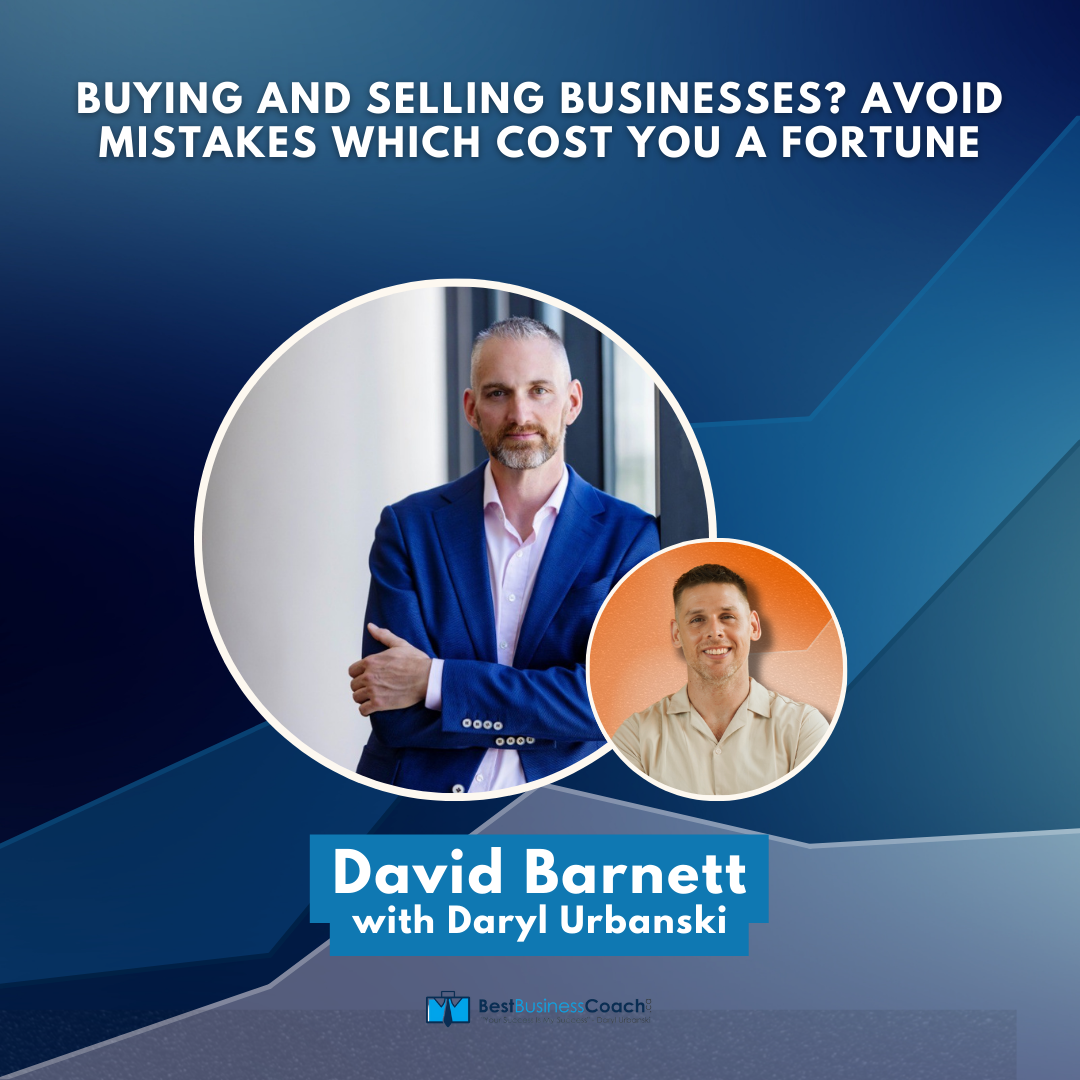David Barnett: Most business owners don’t sell their businesses to get immediate cash. As something that would earn a constant income for them, businesses are only sold when necessary. How do you then navigate around the market of buying and selling unimpaired and lucrative business assets?
In this episode, David Barnett talks about his insights on buying and selling a business online. As a business broker himself, he discusses his experiences with clients who want to buy a business but shouldn't. He provides business advice for managers struggling to get on a certain level of success. Join us and learn more about the dos and don'ts of buying and selling businesses.
Give You ALL Our Best Interviews & Workbooks - FOR FREE?!
Yes! It's like having a business coach in your inbox.
Get all the Best Workbooks + Action Guides from our expert interviews delivered to you weekly.
(No fail).

*We will never rent, sell or pull any nonsense with your info. You may unsubscribe anytime.
We WILL send you useful + helpful tools, templates, info & cool stuff.
Resources
- Invest Local by David Barnett
- Business Buyers Advantage
- Follow David Barnett on Facebook | Instagram | Twitter | Youtube
- Follow David Barnett on LinkedIn
- For more insights about buying and selling businesses, connect with David through his website.
- For more Informative Interviews Click Here.
FREE "Mystery Gift"?
Let me stay in touch with you via email and as a thank you - get this FREE gift.. Something others paid over $1,000 for. (True story)

It outlines how I helped a client do over $1,000,000.00 in under 8 months.
With a single, automated online marketing strategy.
Still in use today.
*We will never rent, sell or pull any nonsense with your info. You may unsubscribe anytime.
We WILL send you useful + helpful tools, templates, info & cool stuff.
My mission is to help you live a long, happy, healthy, joyful & wealthy life.
Episode Highlights
David Barnett Beginnings
- He did not learn much entrepreneurship from his parents
- David has been business-minded as a teenager. He learned about financial statements at a young age.
- He studied business in university but didn’t see entrepreneurship.
- He took a job in the yellow pages, met various business owners, and learned new business models.
- David became a finance debt broker after selling a business he built with his friend.
- He’s the first person to earn a certified designation in his hometown.
Experience as a Business Broker
- He sold 35 companies in 3 years but had months of challenges and no cash flow.
- Business brokerage is either feast or famine, even worse uncertainty than real estate.
- He quit and got a full-time job but came back to selling businesses from a phone call.
- You have no control from deals falling apart. External factors such as banks, regulatory agencies and the government could ruin your deal.
Terms of Buying a Business
- "The terms are more important than the price."
- Most established business are not sold on cash terms
- Payments could be made over time with interest and vary per online businesses.
- Some have royalty-like terms, which could be good for both the buyer and the seller as they support and mentor each other.
Mistakes When Buying a Business
- Buyers fail to recognize the difference between the value of their labor and the return on their investment.
- Most are financial buyers; those who try to replace their income from their job.
- In essence, buying a business is like buying a job and making an investment at the same time. You should follow a good business model.
- You should not undervalue your labor and overvalue your business as a professional business evaluator.
Considerations on Buying and Selling Business
- Maintain a fair market wage to support your family
- Be able to service debt
- Have an adequate cash return on your investment
- If you want a good deal, you have to have a plan
- Quantify the qualitative things in your business
- Some people have buyer's fever. It romanticizes their idea of the business
- Be detached when you make deals
Ancient Secrets Of Lead Generation
This eBook has all the steps you would need to launch your business and help you to Generate Leads
Selling a Business
- People don't sell businesses to "cash-out." They sell when they need to
- Analyze your resources and your potential industries.
- Maintain relationships for a good deal in case you need to sell.
- The majority of businesses are privately sold because they don't want to pay a commission.
- You need a surplus on your fair market wage to know that there is a return of investment.
- People become personified with their business, but you shouldn’t.
- Be objective.
- Try to sell a business as fast as possible.
Business Advice for Entrepreneurs
- Be honest with yourself.
- Know your value.
- If you operate a business and earn the same as if you worked for somebody, it's not a business but a job.
- If you earn even less, then it’s only a hobby.
- Have the discipline to stick to a commitment.
- Maintain consistent behavior and apply a winning formula.
Researching Business Industries
- Companies sell research on industry benchmarks.
- Knowing the right information is essential to set your expectations and capitalize on opportunities.
- You minimize the risk of investing much time trying to sell.
About David Barnett
David Barnett is a business expert and best-selling author. As a former financing broker for 20 years, he understands the ins and outs of the business broker industry. David is a project coach and consultant to business owners who want to either buy or sell a business. Equipped with years of knowledge and experience, he has written over six books about business. He continues to provide valuable content through various workshops and online courses.
Enjoyed this Episode ?
If you enjoyed the podcast, be sure to subscribe and share it with your friends!
Post a review and share it! If you enjoyed tuning in, then leave us a review. You can also share this with your family and friends.

